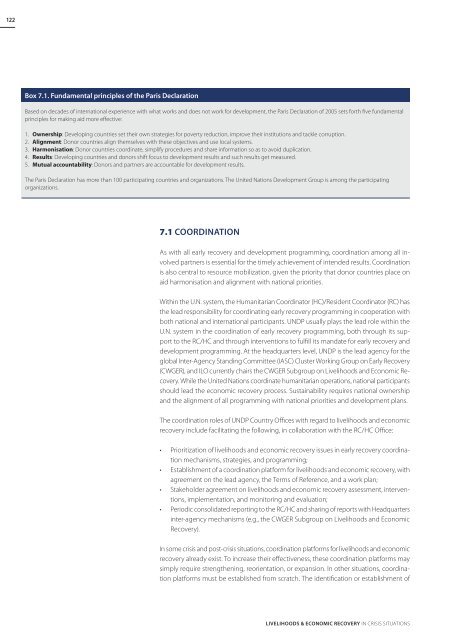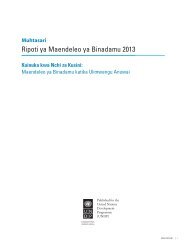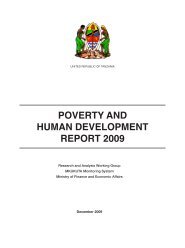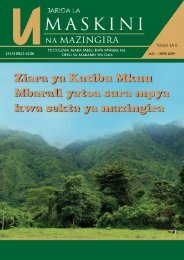Download PDF (4.08 MB) - ReliefWeb
Download PDF (4.08 MB) - ReliefWeb
Download PDF (4.08 MB) - ReliefWeb
You also want an ePaper? Increase the reach of your titles
YUMPU automatically turns print PDFs into web optimized ePapers that Google loves.
122<br />
Box 7.1. Fundamental principles of the Paris Declaration<br />
Based on decades of international experience with what works and does not work for development, the Paris Declaration of 2005 sets forth five fundamental<br />
principles for making aid more effective:<br />
1. Ownership: Developing countries set their own strategies for poverty reduction, improve their institutions and tackle corruption.<br />
2. Alignment: Donor countries align themselves with these objectives and use local systems.<br />
3. Harmonisation: Donor countries coordinate, simplify procedures and share information so as to avoid duplication.<br />
4. Results: Developing countries and donors shift focus to development results and such results get measured.<br />
5. Mutual accountability: Donors and partners are accountable for development results.<br />
The Paris Declaration has more than 100 participating countries and organizations. The United Nations Development Group is among the participating<br />
organizations.<br />
7.1 Coordination<br />
As with all early recovery and development programming, coordination among all involved<br />
partners is essential for the timely achievement of intended results. Coordination<br />
is also central to resource mobilization, given the priority that donor countries place on<br />
aid harmonisation and alignment with national priorities.<br />
Within the U.N. system, the Humanitarian Coordinator (HC)/Resident Coordinator (RC) has<br />
the lead responsibility for coordinating early recovery programming in cooperation with<br />
both national and international participants. UNDP usually plays the lead role within the<br />
U.N. system in the coordination of early recovery programming, both through its support<br />
to the RC/HC and through interventions to fulfill its mandate for early recovery and<br />
development programming. At the headquarters level, UNDP is the lead agency for the<br />
global Inter-Agency Standing Committee (IASC) Cluster Working Group on Early Recovery<br />
(CWGER), and ILO currently chairs the CWGER Subgroup on Livelihoods and Economic Recovery.<br />
While the United Nations coordinate humanitarian operations, national participants<br />
should lead the economic recovery process. Sustainability requires national ownership<br />
and the alignment of all programming with national priorities and development plans.<br />
The coordination roles of UNDP Country Offices with regard to livelihoods and economic<br />
recovery include facilitating the following, in collaboration with the RC/HC Office:<br />
• Prioritization of livelihoods and economic recovery issues in early recovery coordination<br />
mechanisms, strategies, and programming;<br />
• Establishment of a coordination platform for livelihoods and economic recovery, with<br />
agreement on the lead agency, the Terms of Reference, and a work plan;<br />
• Stakeholder agreement on livelihoods and economic recovery assessment, interventions,<br />
implementation, and monitoring and evaluation;<br />
• Periodic consolidated reporting to the RC/HC and sharing of reports with Headquarters<br />
inter-agency mechanisms (e.g., the CWGER Subgroup on Livelihoods and Economic<br />
Recovery).<br />
In some crisis and post-crisis situations, coordination platforms for livelihoods and economic<br />
recovery already exist. To increase their effectiveness, these coordination platforms may<br />
simply require strengthening, reorientation, or expansion. In other situations, coordination<br />
platforms must be established from scratch. The identification or establishment of<br />
Livelihoods & Economic Recovery in Crisis Situations





